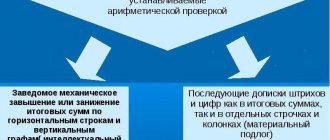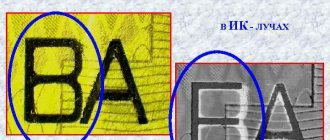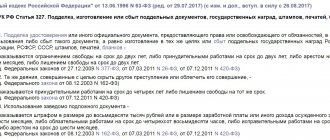The legislator provides for criminal liability for a person guilty of forgery of documents and the use of forged documents. This norm is enshrined in Article 327 of the Criminal Code of the Russian Federation.
ATTENTION: if you are accused of committing a crime under Art. 327 of the Criminal Code of the Russian Federation, you need, obligatory, qualified assistance from our criminal lawyer regarding the elements of the crime associated with forgery of documents. With such support, you can avoid criminal prosecution, conviction and criminal record, or achieve a reduced sentence.
Evidence of a crime
Important! Please keep in mind that:
- Each case is unique and individual.
- A thorough study of the issue does not always guarantee a positive outcome. It depends on many factors.
To get the most detailed advice on your issue, you just need to choose any of the options offered:
- Use the online chat in the lower corner of the screen.
- Call: Federal number: +7 (800) 511-86-74
Responsibility for forging a signature is provided for in Article 327. Criminal Code of the Russian Federation. This article contains information regarding the determination of penalties for persons who have committed: forgery of signatures on documents, production or sale of fictitious documents, imitation of awards, forms, stamps or seals.
Today is 327 Art. The Criminal Code of the Russian Federation with commentaries has two compositions, according to which responsibility for forgery of a signature is divided into the forgery itself and the sale of forged documents.
Confirmation of the crime is considered both in written and material form. Moreover, if we are talking about forging a signature in an agreement, the agreement itself will be considered as material evidence, because In court, it is the material properties of the document that will be of interest. In the event of a forgery of the contract itself, or part of it, this document will be considered as written evidence, namely the information contained in it.
What to do if your license is revoked
Considering that driving a car with a fake driver's license can lead to jail time, there is no need to buy a license. It seems that it is better to just drive without them, then you can only get away with a fine. But keep in mind that it is planned to amend the legislation of the Russian Federation, according to which repeated arrest for driving a car without a license will be considered a criminal offense, and real sentences will be assigned for it.
The most acceptable option is to contact an experienced auto lawyer. If you were deprived of your rights illegally, he will definitely discover this fact and defend your interests in court. When the punishment is quite fair, he will make every effort to reduce it.
Note!
Offering a traffic police officer a bribe is not an option. If he turns out to be a conscientious servant of the law and reports the incident, the punishment will be even more severe.
Rules of law
As a rule, illegally signing papers is only part of the crime. Therefore, below we will provide a list of articles related to this fact.
| Article of the Criminal Code of the Russian Federation | Items | Type of punishment |
| Art. 142 “Falsification of election documents, referendum documents” | Forgery of election documents and voting documents by a member of the election commission or an authorized person, or a candidate. |
|
| Affixing or witnessing false signatures of participants in the voting or electoral process and influencing the decision to nominate a candidate or lists of candidates. The review also takes into account facts of pressure, intimidation or violence, corrupt practices, damage to property or threats to damage property. |
| |
| Illegal storage, transportation or production of voting documents. |
| |
| Art. 292 "Official forgery" | Entry into documents by an official, authorized or private person of knowingly false information or corrections due to selfish or personal motives. |
|
The same unlawful actions, which entailed, among other things, significant non-compliance:
|
| |
| Art. 292 part 1 “Illegal issuance of a Russian Federation passport, or entering false information into documents that led to the issuance of a passport” | Participation in illegal activities that led to the receipt of a Russian passport or Russian citizenship by a person who is not one. |
|
| Unfair attitude towards work by a civil servant, as a result of which citizenship or a passport of the Russian Federation was issued to a foreign person. |
| |
| Art. 332 hours 3 | Illegal registration of a foreign person at the place of residence in the Russian Federation. |
|
| Art. 324 “Acquisition or sale of official documents” |
| |
| Art. 325 “Misappropriation or damage of official documents” | Theft of official documents for profit. |
|
| Theft of personal documents of a citizen of the Russian Federation. |
| |
| Assignment of brands or marks of conformity. |
| |
| Art. 327 “Falsification, sale or sale of fictitious documents” | Forgery of a document that allows one to obtain additional rights or relieve oneself from obligations. This implies both the fact of production for personal use and an attempt to sell. |
|
| Making false documents to avoid liability for another illegal act or to facilitate its commission. | Compulsory labor or imprisonment for up to 4 years. | |
| Use of obviously false documents. |
|
Fine for driving with a fake license
Criminal prosecution does not exempt from administrative punishment. Driving a vehicle with a fake driver's license is equivalent to driving without a license, therefore you will have to bear responsibility for violating the law:
- if you have never had a certificate, the court may order you to pay a fine in the amount of 5 to 15 thousand rubles;
- If you were previously deprived of the right to drive a car and were caught with a fake, then you face: a fine in the amount of 30 thousand rubles, arrest for a period not exceeding 15 days, or compulsory work for a period of 100 to 200 hours.
If a driver is found to have a fake license, a traffic police officer will detain him until the circumstances are clarified, and the car will be sent to an impound lot. Then you will have to pay a considerable amount to return the vehicle back.
Comments on Art. 327 Criminal Code of the Russian Federation
The object of the crime is the method of production and sale established by law: papers of an approved sample, stamps and state awards, as well as forms and seals. The subject of the offense is:
- Official or personal documents that allow you to obtain additional rights or avoid obligations of both legal entities and individuals.
- Fake government insignia, gratitude.
In this case, a personal official document is accepted as identification. It contains complete or partial information about the owner. This could be demographic, social, or job-related data. The concept of another official document refers to papers of an approved sample that allow the use of additional benefits or relieve one from any obligations that have been analyzed.
If examined, a counterfeit document will be one that, in the process of certain actions, began to bear the external and qualitative characteristics of the original. Not only the production itself, but also the use for any purpose of a false document will also be considered a crime.
The use of counterfeit papers will be considered to be presented to officials or private individuals to carry out fraudulent activities or to conceal the fact of a crime. The end of the crime in this case will be the moment of production, sale or presentation of false papers or documents containing fictitious information. A person who has reached the age of 16 and has passed a sanity examination will be considered a person who has committed a crime. If it is implied that the person only produced these papers, or is an authorized person, the crime is considered under Articles 327, Part 3 and 292 of the Criminal Code of the Russian Federation. The corpus delicti in this case is characterized by the established fact of an attempt to use false documents.
Types of fakes
In the modern world, there are two types of signature forgery - manual and technical. Let's look at these issues in more detail, as there are a lot of subtleties.
Manual signature falsification
Due to the development of technology, it is becoming easier for modern criminals to commit crimes every day. Manual signatures are especially often forged, since the process does not require the use of specialized equipment. The manual method of forging a signature includes three types of falsification:
- The first method is the simplest and therefore known to everyone. This is a forgery of a handwritten signature. This requires some talent, because... This method involves restoring from memory or using the original manually. Almost everyone during their school days tried to forge teachers' signatures in their diaries. There are people who have developed this talent and use it illegally. It is usually easy to detect such fraud. As a last resort, an examination of the handwriting is carried out. The analysis requires an experienced professional, an original (usually 10 examples) and paper to be checked. In this case, documents where the signature was affixed with too much time difference are not subject to verification, because with age a person’s handwriting changes and it is more difficult to establish identity.
- The next method is one in which additional improvised means are used during counterfeiting. One of these tools is carbon paper, which is freely available in almost every office supply store. It is believed that such means allow one to achieve better quality during the falsification process.
- The third method involves the use of computer programs and a conventional laser printer. Scanned signatures are restored using a printer on paper. This type of counterfeit is more advanced and requires examination using modern equipment to identify the forgery.
Technical forgery of signature
Technical forgery of a signature is considered to be those methods of falsification that use computer technology, special equipment, or simply improvised means. The difference between a technical forgery and a manual one is that the forgery is not produced by handwriting, but by copying the signature from the original. The most commonly used types of technical counterfeiting are:
- Redrawing the signature in pencil and then tracing the strokes with ink. Typically, a soft pencil is used in this case. It is thanks to him that falsification is detected - coloring pigments remain on the paper.
- Imitation of a signature using special paper, exposed to light or by pressing, followed by tracing the contours with ink.
- A method of forging a signature using substances that have copying properties. In this case, various emulsions, films, photographic paper and even egg white can be used.
- Forgery using an electrographic apparatus. Today this is the most popular way to forge a signature. It is distinguished by the shine of the ink, the absence of relief and flaking of the dye.
- A less popular, but used method is falsification using printers. As a rule, in this case an inkjet or laser printer is used. Dot matrix printers are least suitable for these purposes. This type of forgery is also distinguished by its lack of relief; in addition, tiny drops of toner can be distinguished. It is easy to distinguish such a fake from the original - if water gets in, the outline of the signature will blur.
- Forgery using a printed form - facsimile. This method is the most difficult to determine, because... in this case, the fake will be most similar to the original. A distinctive feature will be the absence of grooves left by writing instruments.
Signs of forgery of a signature or parts of a document
In order to register the fact of signature forgery, it is necessary to identify the signs. They will differ for different methods of producing a forged document, but there are basic, common characteristics:
- The presence of paired lines, the sharpness of rounded strokes, traces of preparation. Such signs indicate that the signature was copied from the original.
- The presence of unnatural thickenings, blunt ends of lines, excessive tortuosity. These characteristics characterize the copying method of counterfeiting using glass.
- If you copy using special paper, the document will show pigment marks and poor line alignment. This sign is easy to detect - all you need is a magnifying glass and good lighting, or an infrared lamp.
- When falsifying a signature using materials with increased copying ability, emulsion particles can be found on the paper. There will also be no relief. Upon closer examination, you can see that the tinting of the signature is uneven, and small splashes of paint will be found next to the signature.
Features of bringing to responsibility
In order to bring the perpetrators to justice, it is necessary to have a falsified document and a professional expert’s opinion confirming the fact of forgery. It is necessary to have papers with a fictitious signature on hand, because they will serve as physical evidence. However, criminal prosecution for signature forgery has a number of features:
- Nowadays, no one will be surprised by forging the director’s signature at work. There are emergency moments in which the person committing this act does not have selfish goals. But in order to avoid punishment for forging a signature, it is still better to obtain written permission from management. If there is none, then an overly proactive employee may be fired for exceeding his authority.
- The situation is different - the employer falsifies the employee’s signature. Forging a signature on a payroll slip is the most common example. Thanks to such forgery, the entrepreneur may not pay the employee wages. If this fact is discovered, you must immediately file a claim in court.
- Forgery of signatures in sales contracts is also common today. If falsification is detected, such a document loses its validity, and the fraudster will be held responsible for forging the signature.
- Forging a signature in the minutes of a general meeting today also involves punishment, because For some time now, this document has been considered official. In this case, the most difficult thing will be to find the culprit of the forgery.
- Article 327 also provides for punishment for forging signatures on documents. The punishment in this case is determined by the court and depends on the severity of the crime.
- Forging a signature on the acceptance certificate may result in the contractor not receiving money for the work performed. In this case, a common mistake could have occurred - some employee signed the act for management. In any case, only examination and trial can help here.
- For violators, forging a signature in court may turn out to be a more serious crime than expected. The fact is that in this case Art. 303 also comes into force. The Criminal Code of the Russian Federation, which considers facts of falsification of evidence and the results of operational investigative activities.
Criminal liability for signature forgery
How can a criminal case of forgery of a signature turn out? Today, forgery of signatures on documents can result in either monetary or more serious punishment, up to and including imprisonment. These cases are few, but they are worth knowing:
- In the case when a criminal case is initiated under Art. 327, the fact of falsification of documents will be considered, thanks to which a person was able to enjoy rights not due to him or to be freed from unwanted responsibilities. Punishment in such a criminal case can be imposed as a restriction or imprisonment for up to 2 years.
- When the falsification was made to conceal another crime or facilitate its commission, the responsibility will be more serious - the offender will have to spend time either doing compulsory labor for 4 years or in prison for the same period.
- If a criminal case is opened against a person who uses a deliberately forged document, but does not produce it, the punishment will be more lenient. In this case, you can get by with a fine of up to 80 thousand rubles, or disciplinary work for up to 2 years. Article 327 of the Criminal Code of the Russian Federation also implies in this case the possibility of arrest. But today there are no arrest houses left in Russia. Therefore, since 1996, the practice of arrest has not been applied.
If the violation concerned the forgery of stamps or signatures on medicine papers, for a single case this means imprisonment for up to 3 years. If an organized group participated in the crime, the imprisonment may be extended. The minimum period for this example will be 5, and the maximum will be 10 years.
Please also note that criminal prosecution threatens both the manufacturer and the person who used the counterfeit papers.
Situation 3 – A court decision was made under an agreement with a forged signature, but it did not come into force
If a court decision has already been made under an agreement with a forged signature, which imposes an obligation on you for which you did not sign, but it has not yet entered into force, urgently write an appeal.
A decision that has entered into force entails the possibility of enforcement proceedings, so your task is to postpone the appearance of the bailiffs for as long as possible.
In your appeal, present all your arguments as described in the previous paragraph. And justify why you did not present them in the first instance - or, if you did, why the court did not take them into account.
As a sample when preparing an appeal, you can use complaints from our clients.
Appeal against a decision to foreclose on a loan or foreclose on an apartment (fake signature)
Petition to reinstate the time limit for filing an appeal (falsified signature)
When there is no liability for forging a signature
A crime is considered to be the case when a document is official, has legal force and releases from any obligations or provides additional benefits. Otherwise, counterfeiting is not considered the subject of a crime.
In addition, let us turn to Article 14 of the Criminal Code of the Russian Federation. It says that although there are signs of a violation, an act or inaction of a person is not considered a crime if it does not cause harm to others.
Bykov Boris Nikolaevich
Lawyer at the Legal Defense Board. Candidate of Legal Sciences. Work experience in the field of criminal law - 14 years. Defense in court, full case management, preparation of documents.
Summary
So, we have described an approximate sequence of actions in a situation where someone forged your signature and you have problems in this regard. You can use our tips and go through the process yourself. We are always ready to support you in an advisory manner.
We have developed positive judicial practice in invalidating contracts with a forged signature, and have experience in arguing and organizing the process. You can familiarize yourself with court decisions in our cases and use arguments to defend yourself in similar situations.
Decision to invalidate the surety agreement (falsified signature)
Decision to invalidate the loan guarantee agreement (falsified signature)
If you don’t want to conduct the process on your own, please contact us. The main goal of our work is to help everyone in our power and capabilities.








